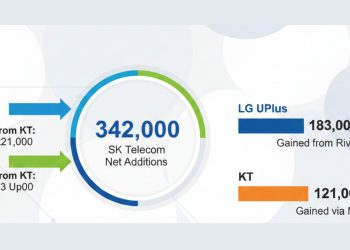In South Korea’s tech landscape, a new era of innovation is being shaped through strategic collaborations. South Korea’s tech marketplace has witnessed a remarkable surge in collaborative efforts among industry giants in the last quarter. This article zooms in on the top 10 initiatives that have flourished during this period, driving innovation to the forefront.
South Korea’s Collaborative Pursuit of Intelligent Homes

South Korean government, alongside industry leaders like Samsung, LG, Hyundai E&C, and Korea Land & Housing Corp. (LH) took the initiative known as “Intelligent Home” (AI@Home). This collaborative initiative has started intelligent living spaces within apartment complexes, reshaping residential standards by infusing cutting-edge technologies. It was unveiled during the Emergency Economic Ministers’ Meeting on August 9.
The introduction of the trailblazing “Intelligent Home (AI@Home) certification” streamlined the growth of intelligent homes and fortified the adoption of smart living solutions. As the project unfolded, establishing the “Intelligent Home Alliance” within the same year has taken the collaborative spirit propelling South Korea’s tech journey.
Encompassing sectors from construction to home appliances, device manufacturing, and artificial intelligence integration, this alliance has united diverse industries to usher in a new era of intelligent living.
Qualcomm and Hyundai’s Collaboration on Purpose-Built Vehicles

On August 3, Qualcomm Technologies, Inc. joined hands with Hyundai Motor Group (HMG) to pave the way for the evolution of purpose-built vehicles (PBVs). The partnership centers on integrating Qualcomm’s cutting-edge Snapdragon® Automotive Cockpit Platforms into Hyundai’s PBV infotainment system.
PBVs envisioned as the future of mobility, hold the potential to revolutionize transportation services by offering tailored experiences in comfort, logistics, commerce, and healthcare for individual users.
The integration of Qualcomm’s Snapdragon® Automotive Cockpit Platforms aims to deliver an all-encompassing, intelligently connected user experience.
Kia’s Collaborative Leap into Robotics with Boston Dynamics

In collaboration with Boston Dynamics—an American robotics firm acquired by Hyundai Motor Group in 2021—Kia unveiled its plans to introduce a new robot in 2024. This announcement surfaced in the latest sustainability report the South Korean automaker released on August 1.
Leveraging its manufacturing and production capabilities, Kia plans to explore diverse horizons, including robotics logistics and unmanned delivery services. The company’s foray into robotics is a strategic pursuit as the demand for innovative applications across sectors grows.
Hyundai Elevator’s Collaborative Endeavour into Robotics

On July 27, in tandem with KT and LG Electronics, Hyundai Elevator landed on a collaborative journey to start robotics services for smart buildings and cities. The trio sealed their partnership through an MOU to fuel the robot-elevator linkage business.
The agreement outlines a shared mission to enhance mobility competitiveness, laying the groundwork for innovative elevator and robot interlocking services while exploring new avenues for business expansion.
As they steer the trajectory of robotics innovation, Hyundai Elevator, KT, and LG Electronics exemplify the transformative power of strategic collaboration in shaping the future of smart living environments.
South Korea’s “Industrial AI Alliance”

On July 25, South Korea officially unveiled the “Industrial AI Alliance.” This alliance, a congregation of 20 major companies from pivotal sectors, including Hyundai Motor Company, LG Electronics, Hyundai Steel, LG Energy Solutions, as well as digital transformation (DX) suppliers such as Samsung SDS and SK C&C, set the stage for a collective pursuit of innovation and digital transformation.
This alliance’s genesis traces back to the evolution and reorganization of the preexisting “Industrial Digital Transformation Solidarity,” formed in 2020, which drew active participation from over 400 companies and institutions.
The alliance’s collaborative intent is to lay out novel pathways to innovation, driving a sweeping wave of digital transformation that resonates with South Korea’s economic landscape.
LG Uplus and Kakao Mobility’s Collaborative Venture

On July 3, a collaborative partnership took place, holding transformative potential for South Korea’s electric vehicle (EV) charging landscape. LG Uplus, the nation’s third-largest mobile carrier, teamed up with Kakao Mobility, a tech giant Kakao Corp. subsidiary, to establish a joint venture marking their entry into the EV charging station domain.
The collaborative agreement signed encompassed a joint investment of 25 billion won ($19 million) from both entities, with LG Uplus securing the managerial reins of the joint venture, thus holding a majority stake of 50% + 1 share, while Kakao Mobility retaining the remaining shares.
The envisaged joint venture has targeted the end of the year to finalize the venture’s formation. This process includes crucial steps such as selecting the company’s name, crafting its corporate identity, outlining strategic directions, and assembling the necessary human resources.
With this partnership, LG Uplus contributes its experience in nationwide infrastructure construction and operation, while Kakao Mobility leverages its experience in running the premier mobility as a Service (MaaS) platform.
Kakao Mobility and Kia’s Collaborative Venture

A partnership took shape on May 15, as South Korea’s Kakao Mobility, a ride-hailing subsidiary of Kakao, joined forces with Kia Corporation, a prominent automobile manufacturer. This collaboration was signed by an MOU, outlining their shared mission to pioneer purpose-built vehicles (PBVs) for ride-hailing services, accompanied by an integrated platform merging vehicle operation data and software.
Within the framework of this agreement, Kia undertook the task of customizing PBVs utilizing vehicle operation data to meet Kakao Mobility’s specific ride-hailing requirements.
The PBV’s development journey is set to unfold over two years, during which it will not only cater to ride-hailing needs but also amass invaluable data and insights for future endeavors.
As part of their collaborative vision, the companies aspired to extend the global reach of their PBV model, propelling it into realms of leasing logistics, car rentals, and transportation, primarily geared towards passengers with disabilities.
Samsung and LG Display’s Collaboration in OLED Displays

On May 18, an alliance unfolded Samsung Electronics and LG Display, two stalwarts of the South Korean tech landscape, forged an agreement to jointly explore the realm of organic light-emitting diode (OLED) displays.
While LG Display has traditionally dominated the landscape of cost-effective OLED TV screens, epitomized by the popular LG C3 OLED models, the collaboration between Samsung and LG Display opens doors to fresh possibilities.
According to a report, LG Display is gearing up to supply OLED TV panels to Samsung Electronics as early as the second quarter, with plans to ship around 2 million units in the coming year, followed by an increase to 3 million and 5 million units in subsequent years.
As each strategic partnership unfolds, it becomes clear that the power of collaboration transcends competition, leading to the birth of revolutionary ideas and solutions. From intelligent homes to purpose-built vehicles and beyond, these alliances are not just about technology but about transformation.
As South Korea’s tech ecosystem continues to thrive on collaboration, the impacts of these ventures are expected to boom across industries and reshape the global technological landscape.
Read more from KoreaTechToday
- Hyundai Motor Group Forges $398 M Partnership with Korea Zinc for EV Battery Materials
- Continental Korea hosted “Continental X Born2Global Startup Open Innovation” at the Pangyo Startup Campus
- Gyeonggi Center for Creative Economy & Innovation(CCEI) held the 15th Startup 815 IR at the Pangyo Techno Valley
- South Korea’s Plans Ultra-Low-Power AI Chips Target 10 Trillion Operations by 2030







